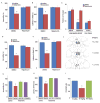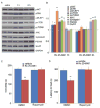mTOR-dependent synapse formation underlies the rapid antidepressant effects of NMDA antagonists
- PMID: 20724638
- PMCID: PMC3116441
- DOI: 10.1126/science.1190287
mTOR-dependent synapse formation underlies the rapid antidepressant effects of NMDA antagonists
Abstract
The rapid antidepressant response after ketamine administration in treatment-resistant depressed patients suggests a possible new approach for treating mood disorders compared to the weeks or months required for standard medications. However, the mechanisms underlying this action of ketamine [a glutamate N-methyl-D-aspartic acid (NMDA) receptor antagonist] have not been identified. We observed that ketamine rapidly activated the mammalian target of rapamycin (mTOR) pathway, leading to increased synaptic signaling proteins and increased number and function of new spine synapses in the prefrontal cortex of rats. Moreover, blockade of mTOR signaling completely blocked ketamine induction of synaptogenesis and behavioral responses in models of depression. Our results demonstrate that these effects of ketamine are opposite to the synaptic deficits that result from exposure to stress and could contribute to the fast antidepressant actions of ketamine.
Figures




Comment in
-
Neuroscience. A glutamate pathway to faster-acting antidepressants?Science. 2010 Aug 20;329(5994):913-4. doi: 10.1126/science.1194313. Science. 2010. PMID: 20724626 No abstract available.
-
Psychiatric disorders: Ketamine modifies mood through mTOR.Nat Rev Neurosci. 2010 Oct;11(10):666. doi: 10.1038/nrn2916. Nat Rev Neurosci. 2010. PMID: 21080533 No abstract available.
-
Role of the mTOR signaling pathway in the rapid antidepressant action of ketamine.Expert Rev Neurother. 2011 Jan;11(1):33-6. doi: 10.1586/ern.10.176. Expert Rev Neurother. 2011. PMID: 21158553
References
Publication types
MeSH terms
Substances
Grants and funding
LinkOut - more resources
Full Text Sources
Other Literature Sources
Medical
Miscellaneous

